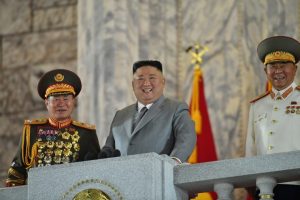North Korea may have restarted Monday the inter-Korean hotline Pyongyang unilaterally cut in August, but the North Korean military has reportedly bolstered internal ideological education to “guard against the spread of the Korean Wave.”
The Korean Wave refers to the growing popularity of South Korean pop culture, especially in East Asia.
According to a Daily NK military source in Pyongyang, the North Korean military’s General Political Bureau distributed to the entire military on Thursday “collective study materials” calling for soldiers to “boldly defeat imperialist schemes to ideologically and culturally infiltrate” the country and “establish a revolutionary military spirit.”
The political study materials involve a week’s worth of self-study, lectures, exercises, criticism and Q&As aimed at young soldiers throughout the military, supervised by unit propaganda departments and youth activities departments.
What is worth noting is that with the materials distributed on Thursday, North Korean military authorities launched their ideological education program the very day after national leader Kim Jong Un announced through local and international-facing media Pyongyang’s intention to restart the hotline.
The move is seemingly aimed at getting a grip on potential ideological laxity within the military before authorities begin restoring dialogue and ties with the South.
In fact, the materials warn that though the North Korean military possesses modern weaponry as a nuclear power, socialism “will collapse overnight like a water-logged wall” if authorities carelessly educate young soldiers.
The materials also warned that young soldiers, the “main force of the People’s Army that must protect the peace of the fatherland and the people,” are “still oblivious to the importance of establishing a revolutionary military spirit.” They then list instances of young soldiers “blinded by bourgeois ideology and culture.”

For example, raw recruits in a battalion with new recruits under the General Staff Department’s Communications Bureau performed a “strange dance” during the unit’s downtime. Worse yet, the dance became a fad within the unit.
This suggests the soldiers were busted for imitating dances by South Korean pop groups like BTS, which are popular among young North Koreans.
The materials also shared examples of punishments meted out by individual military units. They pointed to eight guardpost personnel in the Second Corps who were punished for “failing to adhere to report processing methods for enemy materials” and a soldier of the Seventh Corps who received “legal punishment” for hiding a memory stick or card with South Korean songs in his uniform when he returned to his unit from leave.
With authorities suggesting soldiers will face similar punishments in the future, military units feel they must accelerate their educational efforts aimed at young soldiers, the source said. As the authorities intensify their “politics of fear,” cadres worry that they could face punishment “as the people in charge.”
The source said “political departments, organizational departments, propaganda departments and youth departments” of units throughout the military will intensively review the ideology of their young soldiers and take measures in response by Party Foundation Day (Oct. 10).
Meanwhile, military authorities have decided to write more frequent detailed reviews of the “ideological tendencies” of individual soldiers. Instead of annual reviews, they will write quarterly reviews, a move likely aimed at recording suspected ideological changes through tighter surveillance.
Moreover, the military’s manpower division has decided to turn over charts from ideological reviews by unit political departments to the social organizations of soon-to-be-discharged soldiers eligible for biannual university recommendations.
The chart transfer will begin during discharge procedures next spring and fall. Soldiers also receive a recommendation letter in their discharge documents.
In the past, ideological problems found during ideological evaluations were overlooked by non-military organizations, the source said.
With the authorities now excluding ideologically problematic soldiers from school recommendations and sharing their ideological records with their social organizations in their discharge documents, everyone is on guard, he added.
Please direct any comments or questions about this article to dailynkenglish@uni-media.net.


















